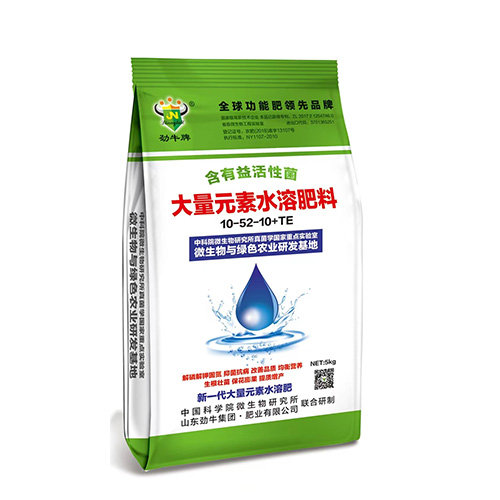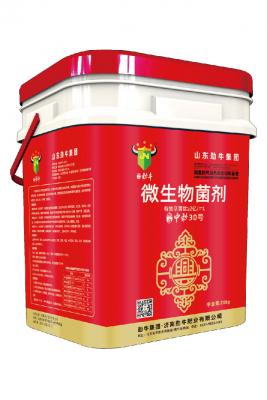Microbial fertilizer to revolutionize the life of chemical fertilizer?
At present, microbial fertilizers cannot replace chemical fertilizers, and chemical fertilizers cannot replace microbial fertilizers. But when microbial technology develops to a certain extent, it is possible that microbial fertilizers will completely replace fertilizers. Gao Xiangzhao, chief expert of the National Agricultural Technology Extension Service Center, recently affirmed the market prospects of microbial fertilizers. Is this the rhythm of the fertilizer market to "revolutionize"? The reporter conducted an in-depth interview for this purpose.

During this year's field visit, the reporter found that in shandong, Henan, Shaanxi, Gansu and other major cash crop areas, especially the aging fruit tree area, microbial fertilizer has become the preferred fertilizer for dealers and farmers to ensure crop yield, quality, and recover economic losses.
"Why has China's fruit industry been shrouded in depressed prices in the past two years? The reason for this is that the land is no longer available, and the second is that the peasants have relaxed their management. These two factors have seriously reduced the yield and quality of Chinese fruits. Jiang Yuanmao, a professor at Shandong Agricultural University, showed reporters such data.
Taking apples as an example, at present, China's apple cultivation area accounts for 1.7% of the total cultivated area, but it consumes 3.7% of the amount of fertilizer used. The blind application of chemical fertilizers in large quantities has seriously caused problems such as soil acidification, salinization, and compaction. The data shows that in Shandong Province, the main apple-producing area, nearly 69% of the orchard soil pH is less than 6, and the degree and scope of acidification are increasing year by year. In addition, the amount of organic matter in the soil is plummeting, with an average of only 1% in most areas. Jiang Yuanmao stressed that the carbon-nitrogen ratio in organic matter is one of the key elements of fruit tree yield, generally at 20, and now most of Shandong is only 7.
For the problem of crop hazards caused by soil deterioration, Li Changxian, the head of agricultural technology of Shijiazhuang Chuangjin Agricultural Science and Technology Co., Ltd., who has been rooted in the grassroots for many years, has a more intuitive feeling. The eastern part of Shijiazhuang is the main production area of orchards such as grapes, apples and pears, as well as greenhouses such as tomatoes and cucumbers. "In the past two years, crop diseases have become more and more numerous and heavier, and there are many fertilizers, and the yield cannot go up, especially the quality is getting lower and lower!" The problems that Li Changxian gave back were very common in the eastern part of Shijiazhuang. Li Changxian told reporters that according to his observation, about 10% of the local fruit trees have developed symptoms of rotten roots and dead trees, and the dominant symptoms caused by yellow leaf disease, leaflet disease and other diseases have reached 30%. The incidence of replant disease in vegetables climbed to 20% to 30%.
"The disease is so serious, in the final analysis, it is still a problem of soil!" Li Changxian attributed the reasons for the increase in local diseases year by year to two points: First, the serious infection of pathogens. "Crops are continuously harvested, and stubble is particularly severe. In addition, farmers abuse chemical fertilizers for high yields, the area of land compaction and acidification is getting larger and larger, and the soil is not replenished with organic matter and microorganisms in time. "Li Changxian said that normal fruit trees can produce normal results for more than 40 years, but now most of the local fruit trees will have various problems in more than 10 years, and the lack of soil and organic matter and microorganisms will cause the root system of fruit trees to move up, nutrient absorption and resistance are deteriorated, and it is naturally easier to get sick; second, the soil is poorly cultivated." Now farmers plant maps to save trouble, not as deep as before, the soil is already compact, not conducive to the growth and absorption of fruit tree roots. ”
In view of the low yield and quality of fruit trees caused by soil deterioration, Jiang Yuanmao called for the transformation from the era of large fertilizers to the era of microbial fertilizers.
The application of sufficient microbial fertilizer can play multiple roles in improving soil structure and properties, providing organic nutrition, promoting plant growth and strengthening, and inducing plants to enhance disease resistance. Professor Cao Keqiang of the College of Plant Protection of Hebei Agricultural University showed reporters the relevant data of microbial fertilizer application on different crops: strawberry plants are relatively robust and the fruit is larger; the yield of sugar beets is as high as 80.6%, the proportion of healthy seedlings is significantly improved, the incidence of root rot is reduced by 19.7%, and the comprehensive incidence is reduced by more than 55%; the effect on the prevention and control of banana blight is obvious; the apple tree does not show any stubble obstacles..., and many crop data have significant effects. However, although over the years, microbial fertilizers have been recognized and praised by many grass-roots growers in actual production, due to the impact of the low prices of agricultural products, many farmers still refuse to invest too much in agricultural materials. In response to this phenomenon, 3 agricultural resources separately calculated such an economic account about microbial fertilizers to reporters.
"Microbial fertilizer is not a panacea, but it is more effective for leaf disease, yellow leaf disease and heavy stubble problems caused by soil problems." Li Changxian said that as long as the disease of fruit trees is controlled within half of the degree, they can try to treat them with microbial fertilizers, and the cure rate is about 70% to 80%. "But if we don't use microbial fertilizer to treat, the tree dies, according to the local income of more than 10,000 yuan per mu of apple land, the result loss of this tree that year is more than 200 yuan." Farmers also have to buy seedlings again, assuming that the survival rate is 100%, which cannot be achieved within 2 years, and the loss is more than 400 yuan, which does not include labor and water costs. The loss of a single tree alone is 700 to 800 yuan. In addition, when one tree becomes ill, it will also pass the virus to other fruit trees through a shovel, although the speed is slow, but the loss cannot be ignored. Li Changxian calculated that the price of a bag of local microbial fertilizer is generally 100 to 130 yuan, which can indeed help farmers save unnecessary losses. Compared with fruit trees, the spread of heavy stubble disease in vegetable greenhouses is very fast, and watering the whole shed may also cause a large outbreak of diseases, and even extinction, Li Changxian believes that for vegetable farmers, microbial fertilizer can save them more losses.
Zhongke No. 1 compound microbial agent is jointly developed by the Chinese Academy of Sciences and Shandong Jinniu Shares, the agent contains a more active microbial flora and a variety of active enzymes, decomposing the active ingredients in the soil through the life activities of microorganisms, playing a role in dissolving phosphorus, potassium and nitrogen fixation, reducing the amount of fertilizer used; at the same time, it can produce plant hormones, acidic substances and vitamins needed by various crops, which can stimulate and regulate plant growth to varying degrees; and can produce iron carriers, antibiotics, A variety of substances such as system defense enzymes can inhibit bacterial or fungal diseases or induce systemic resistance to indirectly achieve the effect of promoting plant growth. It can be applied to the cultivation of various food crops and vegetables, and can also be applied to the cultivation of cash crops such as fruit trees.



